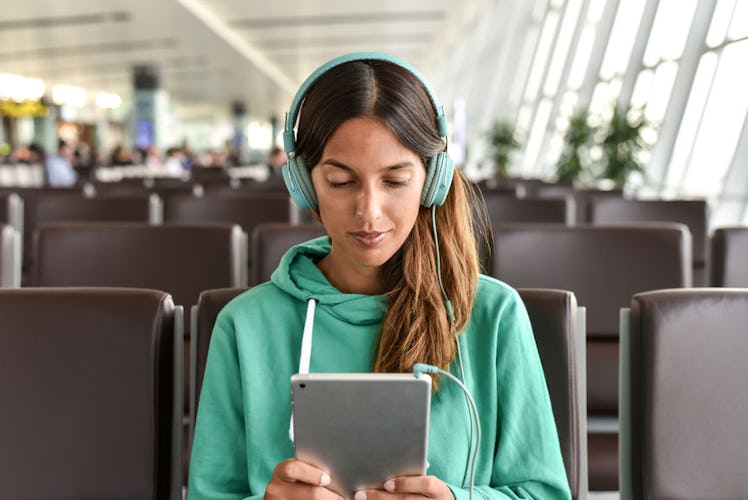
The Dirtiest Places On An Airplane Will Make You Cringe So Unbelievably Hard
Let's be real: airplanes are germ factories. You're stuck in an airtight capsule many miles up in the sky with dozens of strangers, breathing each other's air, sneezing, coughing, and you're all sharing a bathroom the size of a shoebox. It's one of those things that, if you think about it too much, is almost enough to keep you on the ground forever, even if it means driving to that family reunion all the way across the country. So when CBC News reported that a new Canadian study revealed some of the dirtiest places on an airplane, let's just say it didn't exactly lend anything to the reputation air travel already seems to have when it comes to cleanliness (or lack thereof).
But really, if you're planning to get on a plane any time soon, you might want to save this article for later. Here's how the new study went down: According to CBC News, staff from the Canadian watchdog news program, Marketplace, booked 18 short flights on three different airlines. To ensure they randomized the samples they took from each plane, the flights were all booked at different times throughout the day, and the Marketplace staff chose different seats each time to guarantee they covered all their bases as best as they could.
In order to collect samples of bacteria and germs found on each plane, the Marketplace staff, as per the news program's blog, took sterile cotton pads dampened with sterile distilled water, swiped several different surfaces (including headrests, seat belts, seat pockets, tray tables, and even the insides of bathroom doors), and then placed those pads inside protective pouches to send off to the lab for further analysis.
But that's not all — the Marketplace staff also tested those blankets you sometimes get on a flight (in their original packaging, FYI) "to identify any gross contamination from biological fluids," as per the news program's blog. Ugh, I'm already feeling nauseous, guys.
Last, but certainly not least, the Marketplace staff also tested the air quality on each plane. According to the news show's blog, the sample collectors wore sterile surgical face masks over the nose and mouth and breathed normally for about 20 minutes. The masks were then removed and placed into bags to be sent off to the lab.
All of these swabs and samples were tested "for a number of different types of bacteria," according to CBC News, "as well as yeast, mould, E. coli and other pathogens." I know, it's almost too gross to even think about. But here's where things get real, real bad: Microbiologist Keith Warriner, who tested the samples for all of those different kinds of bacteria, told CBC News that even he was "amazed" by his own results. Gulp.
As per CBC News, about half of the surfaces sampled in this study showed "levels of bacteria or yeast and mould that could put a person at risk for infection." And the most contaminated surface on the whole plane? The headrest — yeah, that thing you lay your head on while you're just trying to take a freaking innocent nap.
Oh, but trust, that's not all. Warriner told CBC News that one of his most alarming findings was the E. coli bacteria found on not only the headrests, but also the seat pockets. In case you don't know, finding evidence of E. coli, according to the news outlet, "indicates fecal contamination, and the bacteria can cause intestinal infections, with symptoms that can include diarrhea, vomiting and abdominal pain."
So uh, does this mean you should never fly again? Well, no. It just means you might have to take responsibility for your own hygiene and cleanliness when it comes to air travel. Because the thing is, according to USA Today, "proper cleaning doesn't occur that often" on most airplanes. Sigh.
As for how to keep things tidy and clean on your next flight, CBC News recommends stocking up on plenty of hand sanitizer and antibacterial wipes, and wiping down any areas or surfaces you know you're going to touch or come in contact with throughout the flight — and yeah, maybe don't tuck your phone into the seat pocket, either. Better safe than sorry, right?